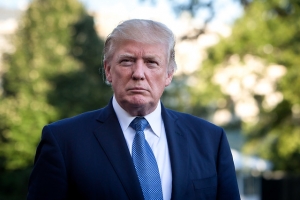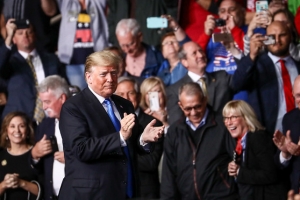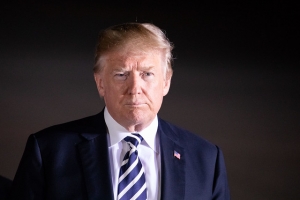Support migrant centric journalism today and donate

Comments by Sanwar Ali:
There are conflicting opinions in the White House amongst Donald Trump’s senior advisers on US immigration policy. Jared Kushner Trump’s son-in-law has a more liberal view on immigration than say Stephen Miller another senior advisor to President Trump. Jared Kushner’s recent plans for the U.S. immigration system is to increase funding for border security, increase the number of visas for certain foreign workers, and to reduce family based immigration.
Kushner’s plans have been attacked by both pro-migrant groups and hardline anti-immigration groups. Stephen Miller, who despite being Jewish, has been accused of having links to white supremacist groups, has very harsh, anti-immigration views. Another anti-immigration grouping are four Republican Senators who have recently pressed for a 60 day suspension of certain work related non-immigrant visas. Another thing that Trump may wish to take into account is that his businesses need a supply of overseas labour. So perhaps US visa policy will never be as hardline as demanded by the extreme right.
The Trump administration plans to extend coronavirus-related US border restrictions indefinitely, according to a New York Times report. Trump has been accused of using the COVID-19 pandemic to further tighten US visa and immigration restrictions and now plans to extend migrant lockouts until a health official declares the disease no longer a threat.
Migrants seeking protection from persecution face being left stranded at US borders if restrictions are extended indefinitely. It’s understood that a draft version of a public health order outlines plans to restrict entry into the US for the foreseeable future.
On March 21 a 30-day restriction on all non-essential travel into the US from Canada and Mexico was imposed by the Centers for Disease Control and Prevention (CDC), with all legal points of entry closed to tourists and anyone caught entering the US illegally, immediately returned across the border back into Mexico or their home nations.
Since the 30-day restriction was introduced, just two migrants have been allowed to remain in the US and claim asylum, according to a United States Citizenship and Immigration Services (USCIS) official.
Restrictions extended by a further 30 days
The initial 30-day restriction imposed by the CDC was extended by a further 30 days on April 20, a move orchestrated by the architect of President Trump’s US immigration agenda, Stephen Miller. Arguably Trump’s top aide, Miller has aggressively used public health laws to limit immigration while the US fights coronavirus.
The new order is currently under review by several US government agencies. Under the order, if issued by CDC director Dr. Robert R. Redfield, US border restrictions would remain in force until it’s determined that the virus no longer poses a risk.
However, some immigrant advocates have criticised the hypocrisy of plans to extend border restrictions, referring to Trump’s repeated calls for states to reopen their economies having argued that the threat of coronavirus will quickly disappear.
An excerpt from the draft order, seen by The New York Times, reads: “I am extending the duration of the order until I determine that the danger of further introduction of COVID-19 into the United States has ceased to be a danger to the public health.”
Although the CDC is required by law to review the risks posed by the virus every 30 days, the new order implies that borders will remain closed to immigrants until Dr. Redfield decides otherwise.
Coronavirus immigration clampdown
Trump’s government has ruthlessly pursued immigration restrictions under the guise of protecting public health amid the coronavirus. Already refugee flights, US naturalization ceremonies and the approval of thousands of green cards for those outside the US, have been blocked.
However, the President has recently allowed temporary work visas to be issued to seasonal workers and those deemed to be farmworkers and meatpackers, many of whom are immigrants and considered to be essential workers in the United States amid the pandemic.
Trump has also allowed a 60-day grace period for those in the process of applying for US work visas and green cards, before coronavirus hit the US, to submit requested documents as part of their application.
No date for indefinite extension of border restrictions
No set date has been given for the extension of border restrictions, but the US Department of Homeland Security (DHS) insists that an extension is needed to reduce the risk of the disease spreading in US immigration detention centers along the border. The current restrictions are set to expire on May 21.
So far, the White House has offered no comment on plans to extend border restrictions indefinitely.
Meanwhile, according to The New York Times report, CDC director Dr. Redfield has given no explanation of the criteria he has used to extend border restrictions, but it’s understood that the same criteria has been used to refuse entry to children who cross the border, rather than referring them to a shelter managed by the Office of Refugee Resettlement.
Immigrant advocates have expressed deep concerns about the plans being indefinite, accusing Miller and Trump of using the coronavirus pandemic to enforce visa and immigration restrictions they have long sought to make permanent.
Over the past three years, the Trump administration has already established a number of US visa and immigration restrictions, with Miller and the Trump administration using public health laws, even before the coronavirus struck, to further reduce immigration.
Immigration ban not about pandemic
Advocacy director for Amnesty International, Charanya Krishnaswami, claims that the border ban was never about the pandemic, saying: “This ban was never about the pandemic, and it was never about public health.”
“It’s clear that the Trump administration is weaponizing COVID-19 to achieve the policy objective it’s sought from Day 1: shutting the border to people seeking safety,” Krishnaswami added.
Current restrictions have already hit those seeking humanitarian protections in the United States, hard. Since the initial 30-day ban started on March 21, Border Patrol agents have referred just 59 people for asylum interviews, according to USCIS. Only two of those referred were permitted to stay in the US.
Meanwhile, the cases of three migrants are pending, while 54 have been turned away, according to statistics first reported by The Washington Post.
According to official data, the US has exercised public health powers to turn away more than 20,000 migrants seeking entry at the US border with Mexico since the initial ban was introduced on March 21.
Coronavirus in the US
The US has the highest number of COVID-19 cases and deaths from coronavirus. More than 1.4 million people have been infected in the US and nearly 87,000 people have died from the disease directly or as a result of health complications caused by the disease.
Mark Morgan, the acting commissioner of Customs and Border Protection, said: “The threat we face from outside our borders, from this global infectious disease, highlights the need now more than ever before for border security.”
Latest coronavirus updates, visa and immigration restrictions
For the latest updates on the coronavirus, plus details of visa and immigration restrictions worldwide, check Workpermit.com’s news feed to stay informed.
Workpermit.com can help with US employment-based visas
If you would like to apply for a US work visa – including L1 visas, E1 and E2 visas, O1 visas, B1 in lieu of H1B visas and H1B visas - Workpermit.com can help.
Workpermit.com is a specialist visa consultancy with over thirty years of experience dealing with visa applications. We can help with a wide range of visa applications to your country of choice. Contact us for further details. You can also telephone 0344 991 9222.





















